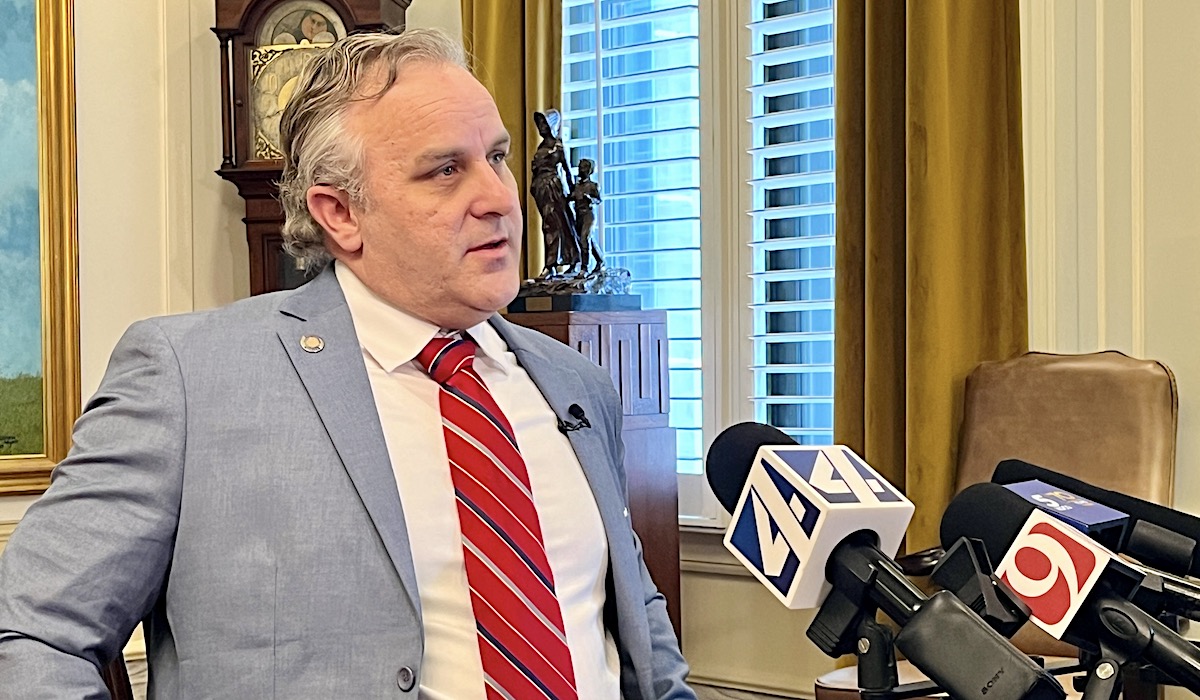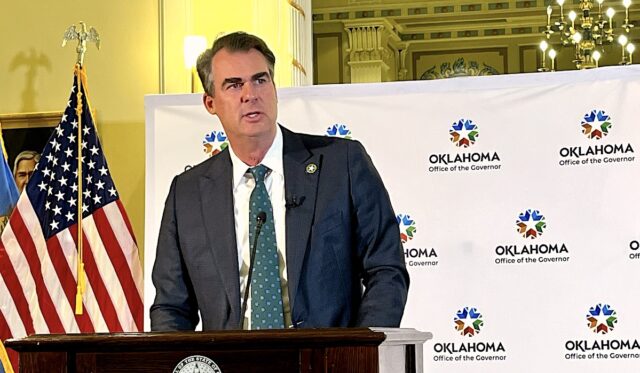Keeping tabs on policy developments and political dynamics in the state of Oklahoma can feel like shoveling sand off the beach with a fork.
As another wild week featuring electrical-cord chaos and above-freezing snow comes to a close, make sure you’re up to speed on a few items of note, mostly involving decisions by the governor.
Treat calls Stitt’s plan to play in #okleg elections ‘very stupid’

While he won’t be on the ballot himself, Gov. Kevin Stitt has plans to be active in Oklahoma’s 2024 electoral cycle, possibly in an effort to affect the balance of power in the Senate Republican Caucus and achieve veto-proof support in the chamber’s most conservative wing.
Three weeks ago, Stitt said he will be actively campaigning for legislators who support issues he backs, such as school choice policies and lower taxes. Candidate filing for the 2024 legislative electoral cycle is set to run April 2 through April 5 next week.
“Listen, I’m never going to shy away from limited government, smaller government, the freedoms that we believe in, the free market principles, the school choice, the smaller taxes,” Stitt said during his press availability March. 8. “So, absolutely, I mean, if there’s candidates that I think are going to line up with Oklahoma values, and there’s candidates that don’t, then I 100 percent will play in the primaries and get involved and try to let Oklahomans know what I think.”
Since then, Stitt and his team have been working to raise money for their operation, according to Senate President Pro Tempore Greg Treat (R-OKC).
“It’s a very small community when it comes to the political world. I know he is fairly new to it, but all of us talk. And it’s an even smaller group of people who fund these ventures, and we’ve heard from people who have been hit up from his operation to go after our members, and that’s not well received.”
Treat called the possibility that Stitt could raise and direct millions of dollars against Senate Republican incumbents “very stupid.” He said doing so “would put him on an even worse footing with the Oklahoma Senate than he already is.”
“It’s going to be very unwelcome if he tries to take out members of our caucus, and I know there are strong rumors to that end that he is seeking to take out good members of the Republican Caucus, and that would be not received well inside of this building, nor would it be received well outside of this building,” Treat said. “Even though I am termed out, I would do everything that I can outside of this building in a non-official capacity to help my colleagues who are really making a difference in Oklahoma.”
Stitt said he supported several Republican candidates in the 2022 primary election.
“Last year, during the election cycle, I think we were 100 percent on the endorsements that we made with state and Senate members,” he said.
Earlier in March, it was reported that Texas Gov. Greg Abbott received a $6 million donation from a leading advocate for school choice issues and spent it on pro-school choice candidates in Texas GOP primary races. The Austin American-Statesman reported a coalition of House Democrats and 21 Republicans voted to strip a school voucher program in 2023 from an omnibus education bill. Abbott vowed to work against 16 of the 21 House Republicans who were seeking reelection. Candidates whom Abbott gave significant financial support to either won outright or will be taking the incumbent to a runoff.
Stitt said people often call him asking him for election advice.
“They look to their governor to say, who should I vote for? (…) People call me, who do you like in this? What is this person really like? And I’ll continue to advocate for that and let Oklahomans know my opinion,” Stitt said.
Stitt vetos bill expanding APRN scope of practice
On Friday, Stitt vetoed his second bill of the year: SB 458, which proposes expansion of prescriptive authority and scope of practice for advanced practice registered nurses, or APRNs. The topic has lingered as a political fight at the State Capitol for at least a decade.
SB 458, which originated last session and received final passage from the House (79-10) and Senate (33-13) this session, was opposed by the Oklahoma State Medical Association. Several other groups supported it, such as the Association of Oklahoma Nurse Practitioners, the American College of Nurse Midwives, AARP Oklahoma and at least one hospital system.
“Although I am aware of the state’s health care access and workforce challenges, especially in rural communities, SB 458 is not a prudent solution,” Stitt wrote in his veto message. “SB 458 would do one primary thing: enable [APRNs] who meet certain criteria to apply for authority to prescribe independent of physician supervision. And that’s my biggest concern. While APRNs already have the ability to set up clinics in rural Oklahoma and practice in primary care settings, I don’t believe APRNs should be able to prescribe Schedules III through V controlled substances without physician supervision. Further, this bill would allow APRNs to have full practice and prescriptive authority in all specialty categories absent supervision.”
Because the bill contains an emergency clause, it would take 36 votes in the Senate and 76 votes in the House to override Stitt’s veto of the bill. While override conversations are already under way, the issue could further muddy the waters of Senate confirmation considerations on a variety of Stitt appointments to health-related posts.
“I certainly understand the governor’s concern about nurse practitioners having unsupervised prescriptive ability,” said Rep. Marcus McEntire (R-Duncan) who carried the bill in the House. “However, it’s important that people know that nurse practitioners are doing that now with very little supervision, and the bill in question would have set out the rules for what supervision actually is because there are no standards currently in state statute.”
SB 458 had 15 co-authors in the Senate and 19 co-authors in the House, with many hailing from rural areas where mid-level providers are often even more relied upon for primary care services. However, physician groups and some urban lawmakers have expressed concern that the bill’s expansion of ARNP authority would have significant affects in the health care landscape of urban areas.
“Oklahoma desperately needs more healthcare providers, including physicians. The most effective way to grow these numbers is through increased funding for education, residency, and training programs, as well as incentives for those who choose to practice in high-need areas,” OSMA’s president, Dr. Diane Heaton, said in a statement.
Walters praises TPS at State Board of Education meeting
During a four-hour meeting Thursday, Tulsa Public Schools’ officials apprised the State Board of Education on its participation in the Oklahoma Teacher Empowerment Program as part of its required monthly presentation on the district’s improvement plan.
According to the presentation, TPS officials were able to organize and implement the OTEP initiative within eight days after the state board’s meeting Feb. 22. The program intends for OTEP teachers to support more than 1,100 “below basic” students from third grade to eighth grade with targeted small group instruction ahead of testing season.
State Superintendent of Public Instruction Ryan Walters praised the district’s effort.
“To do that in eight days — I just don’t think I can overstate it. It’s one of, frankly, the most remarkable things I’ve seen in education,” Walters said. “I said this last time, but you’re making me say it again: there’s things happening in Tulsa that are a model for the entire state of Oklahoma.”
Sean Berkstresser, executive director of information and analytics at Tulsa Public Schools, said 118 teachers were invited to apply. Of those, only 54 applied and 45 were accepted. Berkstresser said Oklahoma State Department of Education employees will cover for teachers participating in OTEP.
Teachers participating in OTEP will receive a one-time $7,500 salary increase and a $1,500 stipend, totaling $9,000.
After praising TPS officials for their work earlier in the presentation, Don Burdick, the Tulsa-area state board member, asked in a sarcastic manner whether they could have coordinated the OTEP initiative in five days.
“For the record, I am a little worried about setting that precedent for future things because this was huge,” Berkstresser said.
During his opening comments at Thursday’s meeting, Walters announced a new Office of School Choice, which he called a “one-stop shop” for parents and guardians to navigate educational options for students.
“What we will be doing is moving staff, hiring some additional staff to ensure that whether it’s a charter school, a private school, through vouchers or through tax credits, whether it is homeschooling options, whether it’s open enrollment or open transfer — we want to make sure that parents have one place to go where they can navigate what their options are with their child,” Walters said.
The state board also approved waivers for five schools — the Academy of Seminole, KIPP Tulsa, KIPP OKC, Tulsa Classical Academy and Tulsa Legacy Charter School — who requested to be exempt from a rule requiring Oklahoma State Testing Program tests to be administered by certified personnel employed by the district.
“They are asking to be exempt from a rule around who can proctor and give the exam,” Walters said. “These are not districts coming forward saying, ‘Hey, we want to opt out of testing this year.’”
The state board ultimately chose to table appeals from three charter schools that had previously been denied authorization by their local school boards. Those proposed charter schools include Proud to Partner Leadership Academy, which seeks to build a high school in southwest Oklahoma City. The Putnam City Schools Board denied the proposed school’s application, but charter school applicants can appeal to the State Board of Education for sponsorship, and other entities — such as higher education institutions — can also sponsor charter schools that are rejected by a traditional public school’s board.
Similarly, the Oklahoma City Public Schools Board rejected applications earlier this year from the Willard C. Pitts Academy, a proposed middle school intending to launch in northeast Oklahoma City, and P3 Urban Montessori, which plans to educate children ages 3 to 5 in northeast OKC.
Stitt nominates Kenneth Waits to OU Board of Regents
On Wednesday, Gov. Kevin Stitt nominated oil and gas businessman Kenneth Waits to the University of Oklahoma Board of Regents, which governs OU, Rogers State University and Cameron University.

If his nomination is approved by the State Senate, Waits would fill the seat of former Gov. Frank Keating, whose seven-year term ended earlier this month.
The president and CEO of Mewbourn Oil Company, Waits graduated from OU with a degree in petroleum engineering in 1983. He lives in Tyler, Texas, where Mewbourn Oil Company is headquartered.
“Serving my alma mater is an honor, and I’m deeply appreciative to Gov. Stitt for the opportunity to uplift the school I love,” Waits said in a press release. “The students, faculty and staff of OU continue to inspire me every day, and I look forward to giving back to the community in this new role.”
Stitt praised Waits in the same release.
“Ken is a national voice in the energy sector who knows the OU community well,” Stitt said. “Ken loves the University of Oklahoma, and I can’t wait to see how he serves the school as a member of the board of regents.”
In 2007, OU’s Mewbourne College of Earth and Energy was named after the late Curtis Mewbourne, a 1958 graduate who donated tens of millions of dollars to the university over the years, including a massive scholarship matching campaign in the 2000s.
Treat, the leader of the State Senate, said the body’s methodical process of considering and approving — or disapproving — gubernatorial appointees will likely unfold in May as Stitt continues to propose appointees for the hundreds of positions at hand each year.
Stitt appoints Chris Franklin to OSU Board of Regents
Earlier this month, Stitt appointed a college classmate, Chris Franklin, to the Board of Regents for the Oklahoma Agricultural & Mechanical Colleges, filling a vacancy created by the death of Jarold Callahan in December.

“Chris is a great Oklahoman who has served his community with pride for many years,” Stitt said in a press release. “He’s passionate about Oklahoma State University, and his unique experience and perspective will be an asset to students joining the workforce.”
Franklin — whose business ventures include Tall Grass Capital, Onyx Holdings and Coffee Creek Cattle Company — lives in Arcadia and serves on the boards of M&P Foundation, Valor Bank and Oklahoma Christian Schools.
“Oklahoma State University helped shape me into the person I am today, and I am honored that Gov. Stitt has given me the opportunity to serve my alma mater,” Franklin said in the release. “I look forward to working alongside my fellow regents to advance OSU’s mission of promoting learning, advancing knowledge, enriching lives, and stimulating economic development.”
The A&M Board of Regents governs OSU, Panhandle State University, Connors State College, Northeastern Oklahoma A&M College and Langston University, the state’s only historically black college or university. A second decision regarding the board seat currently held by regent Rick Davis is pending. Davis’ eight-year term began in 2016 and is set to conclude April 4.






















